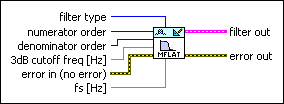DFD Maxflat Design VI
Owning Palette: Special Filter Design VIs
Installed With: Digital Filter Design Toolkit
Creates a lowpass finite impulse response (FIR) or infinite impulse response (IIR) filter with a magnitude frequency response that is maximally flat at 0 and at half the sampling frequency.
You can specify whether this VI creates an FIR or IIR filter.

 Place on the block diagram Place on the block diagram |  Find on the Functions palette Find on the Functions palette |
 | filter type specifies the type of filter that this VI creates.
| ||||||
 | numerator order sets the FIR filter order or the numerator order of the IIR filter. The value must be greater than zero. The default is 2. | ||||||
 | denominator order sets the denominator order of the IIR filter. The default is 2. The value must be greater than or equal to zero if you set filter type to IIR. If you set filter type to FIR or Symmetric FIR, this VI ignores this input. | ||||||
 | 3dB cutoff freq specifies the cutoff frequency in hertz at which the magnitude response of the filter equals –3 dB. The default is 0.25. | ||||||
 | error in describes error conditions that occur before this VI or function runs.
The default is no error. If an error occurred before this VI or function runs, the VI or function passes the error in value to error out. This VI or function runs normally only if no error occurred before this VI or function runs. If an error occurs while this VI or function runs, it runs normally and sets its own error status in error out. Use the Simple Error Handler or General Error Handler VIs to display the description of the error code. Use error in and error out to check errors and to specify execution order by wiring error out from one node to error in of the next node.
| ||||||
 | fs specifies the sampling frequency in hertz. The value must be greater than zero. The default is 1, which is the normalized sampling frequency. | ||||||
 | filter out returns a new filter. | ||||||
 | error out contains error information. If error in indicates that an error occurred before this VI or function ran, error out contains the same error information. Otherwise, it describes the error status that this VI or function produces.
Right-click the error out front panel indicator and select Explain Error from the shortcut menu for more information about the error.
|




